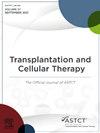对接受造血干细胞移植(HSCT)的血液恶性肿瘤患者进行同伴支持干预:STEPP 概念验证试验。
IF 3.6
3区 医学
Q2 HEMATOLOGY
引用次数: 0
摘要
背景:尽管同伴支持干预与不同癌症人群中患者报告结果的改善有关,但目前还缺乏针对造血干细胞移植(HSCT)患者需求的结构化同伴支持计划:这项单臂概念验证试验旨在完善 "同伴支持移植体验计划"(Supporting Transplant Experiences with Peer Program,STEPP),这是一项针对造血干细胞移植患者的结构化、五次课、手册化、电话传递的同伴支持干预措施,并参考了患者的定性反馈:研究设计:计划接受异体或自体造血干细胞移植的成年血液恶性肿瘤患者在造血干细胞移植住院前两周左右有资格参与研究。参与者接受 STEPP 干预,该干预侧重于提供信息、情感和实际支持。为了完善干预措施,我们进行了半结构化定性退出访谈,以收集对 STEPP 内容的反馈意见,并确定参与的促进因素和障碍。访谈记录由两名编码员采用快速分析方法进行分析:在 37 名符合条件的患者中,25 人参加了研究,20 人完成了所有干预课程,20 人完成了退出访谈。参与者强调,与同伴导师/STEPP 干预人员讨论移植历程和处理临床团队提供的信息是 STEPP 最有价值的方面。第一次干预过程中的积极体验促进了患者参与该计划。参与的潜在障碍包括:在住院期间出现身体症状时与干预人员联系的后勤挑战,以及与不同癌症诊断和/或移植类型的干预人员配对:接受造血干细胞移植的患者对在造血干细胞移植住院前和住院期间通过电话提供的五节同伴支持干预报告了积极的体验。患者对参与 STEPP 干预的障碍和促进因素的描述强调了患者意见和计划结构在针对该人群的同伴支持干预中的重要性。这项概念验证试验的启示将被纳入 STEPP 未来的试验中,以改善造血干细胞移植受者的治疗效果。本文章由计算机程序翻译,如有差异,请以英文原文为准。
A Peer Support Intervention in Patients With Hematologic Malignancies Undergoing Hematopoietic Stem Cell Transplantation (HSCT): The STEPP Proof-of-Concept Trial
Although peer support interventions are associated with improved patient-reported outcomes in diverse cancer populations, structured peer support programs tailored to the needs of patients undergoing hematopoietic stem cell transplantation (HSCT) are lacking. This single-arm, proof-of-concept trial aimed to refine the Supporting Transplant Experiences with Peer Program (STEPP), a structured, five-session, manualized, phone-delivered peer support intervention for patients undergoing HSCT, informed by qualitative feedback from patients. Adult patients with hematologic malignancies scheduled to undergo allogeneic or autologous HSCT were eligible to participate in the study approximately two weeks prior to their HSCT hospitalization. Participants received the STEPP intervention, which focused on providing informational, emotional, and practical support. To refine the intervention, we conducted semi-structured qualitative exit interviews to gather feedback on the content of STEPP and to identify facilitators and barriers to engagement. Transcribed interviews were analyzed using rapid analytic methods by two coders. Of the 37 eligible patients, 25 enrolled in the study, 20 completed all intervention sessions and 20 completed exit interviews. Participants highlighted that discussions with peer mentors/STEPP interventionists about the transplant journey and processing information provided by the clinical team were the most valuable aspects of STEPP. Positive experiences during the first intervention session facilitated patient engagement with the program. Potential barriers to engagement included logistical challenges in connecting with interventionists while experiencing physical symptoms during inpatient hospitalization and being paired with an interventionist who had a different cancer diagnosis and/or type of transplant. Patients undergoing HSCT reported positive experiences with the structured five-session, phone-delivered peer support intervention administered before and during the HSCT hospitalization. Patients’ descriptions of barriers and facilitators to engagement with the STEPP intervention underscore the importance of patient input and programmatic structure in peer support interventions for this population. Insights from this proof-of-concept trial will be incorporated into future trials of STEPP to improve outcomes in HSCT recipients.
求助全文
通过发布文献求助,成功后即可免费获取论文全文。
去求助
来源期刊

Transplantation and Cellular Therapy
Medicine-Hematology
CiteScore
7.00
自引率
15.60%
发文量
1061
审稿时长
51 days
 求助内容:
求助内容: 应助结果提醒方式:
应助结果提醒方式:


